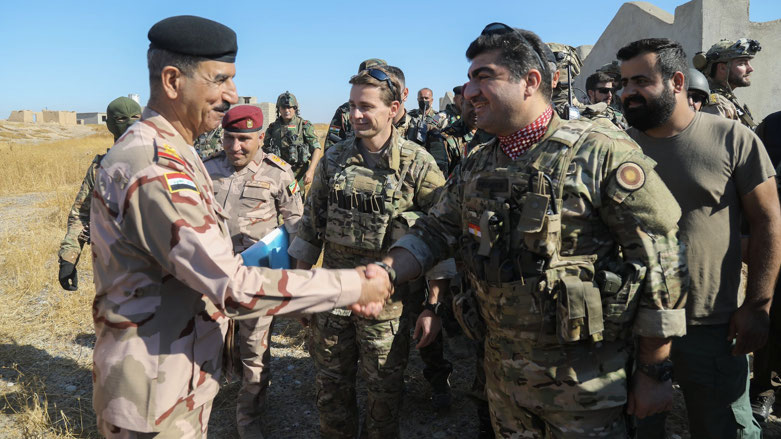Peshmerga conducted 1,650 independent operations against ISIS in October-November: Coalition
The coalition said that the Peshmerga units' basic capability was "adequate in the deterrence of concerted ISIS infiltration."

ERBIL (Kurdistan 24) – The US-led coalition against ISIS said that Kurdish Security Forces (KSF) conducted 1,650 independent operations against ISIS between Oct. 1 and Nov. 30, 2021, a Defense Department inspector general quarterly report to the US Congress said on Tuesday.
The Pentagon Inspector General's quarterly report for Oct. 1, 2021 – Dec. 31 on Operation Inherent Resolve, the official name of the US-led military campaign against ISIS, noted these operations by Kurdish Peshmerga forces "included presence patrols, clearance patrols, observation posts, temporary checkpoints, and reconnaissance missions."
The report also noted that the KSF conducted 29 partnered operations with coalition forces, the ISF (Iraqi Security Forces), or other partner forces from October to December.
Peshmerga capability adequate
The coalition said that Peshmerga units' basic capability was "adequate in the deterrence of concerted ISIS infiltration" but also pointed out "that ISIS conducted successful attacks along the KCL (Kurdish Coordination Line), particularly toward the end of the quarter."
Read More: Peshmerga still adept at counter-ISIS operations: coalition
In response to the Kurdistan Region's September 2017 independence referendum, Iraqi forces and Iranian-backed units of the Popular Mobilization Forces (PMF) pushed the Peshmerga out of the disputed areas between Erbil and Baghdad.
Since then, the areas have suffered from a lack of military coordination across large tracts of land stretching from Khanaqin in central Diyala province to Kirkuk and northward to multiple areas surrounding Mosul. There has also been a security vacuum along the KCL separating Iraqi and Kurdish forces.
ISIS exploits vacuum
The coalition said security along the KCL is a "chief concern" since "ISIS has long exploited the lack of the security in disputed territories to provide safe haven for its fighters and stage attacks along the KCL and adjacent areas."
The US Defense Intelligence Agency (DIA) also "reported that ISIS demonstrated a growing ability to coordinate operations along in the KCL, exploiting poor coordination between the ISF and KSF in this area to attack and kill Kurdish soldiers and civilians."
The Iraqi Army and Peshmerga increased cooperation against ISIS in November after the group launched a series of nighttime attacks that killed over 20 Peshmerga and civilians.
On Dec. 6, a joint brigade of Iraqi and Kurdish Peshmerga entered Lheban village after the village and surrounding areas endured repeated ISIS attacks.
The Pentagon report said that on Dec. 12, ISIS attacked two villages near Makhmour, killing as many as ten Peshmerga troops and three civilians.
Read More: Joint Iraqi-Peshmerga brigade deployed to Lheban village against ISIS: Official
ISIS also carried out an attack on Iraqi security forces in the Diyala province on Jan. 21 that killed at least 11.
In January, Kurdistan Region Prime Minister Masrour Barzani expressed his concern about the increasing number of ISIS attacks in Iraq and Syria following the Diyala attack. He underlined that the Kurdish government "will align our efforts closely with the federal government and global coalition against the terrorist organization."
Read More: PM Barzani emphasizes importance of strong security amidst growing ISIS threat
And recently, on Feb. 7, the Kurdistan Region's Peshmerga forces and the Iraqi Army launched a joint operation in the Sargaran subdistrict of the disputed Kirkuk province against ISIS militants.
Limited Coordination
However, the report said there was still limited coordination against ISIS between Kurdish and Iraqi security forces.
The December operation, for example, was only the second of its kind during the quarter and "occurred amid ongoing efforts, supported by CJTF-OIR (Combined Joint Task Force-Operation Inherent Resolve, the official name of the US-led coalition), to improve coordination between federal and regional forces in Iraq to address the common threat of ISIS."
The report noted that the Peshmerga and ISF have coordinated their operations through Joint Coordination Centers between Peshmerga and Iraqi forces, but have not regularly conducted joint operations.
"The four Joint Coordination Centers intended to facilitate ISF-KSF cooperation continued to appear to be underused, and no operations were conducted from them during the quarter," the coalition said. "A fifth Joint Coordination Center in Erbil, manned by ISF and KSF personnel, also appeared to be underutilized."
The report said the challenge to Iraqi security coordination is the lack of a unified command of Peshmerga forces split between the control of two Kurdish political parties, the Kurdistan Democratic Party (KDP) and the Patriotic Union Kurdistan (PUK).
The Netherlands, the US, the UK, and Germany form the unique Multi-National Advisory Group (MNAG) that supports the unification of KDP's Unit 80 and the PUK's Unit 70 under the command of the Ministry of Peshmerga.
Read More: Dutch Ambassador talks Peshmerga reform with senior KRG official
Moreover, the report noted that there are tensions between Kurdish security forces and Iranian-backed Popular Mobilization Force (PMF) units.
"Kurdish officials say that they do not want security cooperation with the ISF to include the PMF," it said.